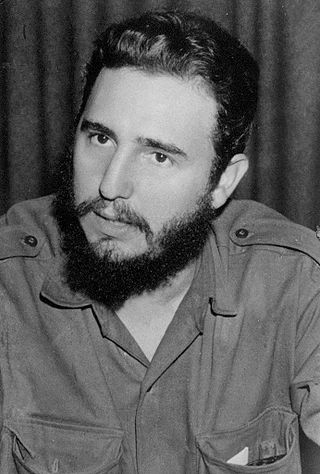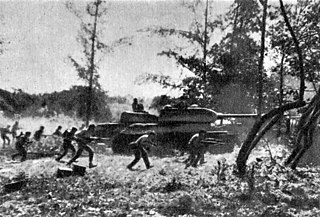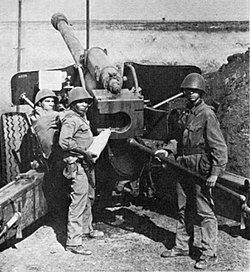The island of Cuba was inhabited by various Amerindian cultures prior to the arrival of the explorer Christopher Columbus in 1492. After his arrival, Spain conquered Cuba and appointed Spanish governors to rule in Havana. The administrators in Cuba were subject to the Viceroy of New Spain and the local authorities in Hispaniola. In 1762–63, Havana was briefly occupied by Britain, before being returned to Spain in exchange for Florida. A series of rebellions between 1868 and 1898, led by General Máximo Gómez, failed to end Spanish rule and claimed the lives of 49,000 Cuban guerrillas and 126,000 Spanish soldiers. However, the Spanish–American War resulted in a Spanish withdrawal from the island in 1898, and following three-and-a-half years of subsequent US military rule, Cuba gained formal independence in 1902.

Cuba's foreign policy has been fluid throughout history depending on world events and other variables, including relations with the United States. Without massive Soviet subsidies and its primary trading partner, Cuba became increasingly isolated in the late 1980s and early 1990s after the fall of the USSR and the end of the Cold War, but Cuba opened up more with the rest of the world again starting in the late 1990s when they have since entered bilateral co-operation with several South American countries, most notably Venezuela and Bolivia beginning in the late 1990s, especially after the Venezuela election of Hugo Chávez in 1999, who became a staunch ally of Castro's Cuba. The United States used to stick to a policy of isolating Cuba until December 2014, when Barack Obama announced a new policy of diplomatic and economic engagement. The European Union accuses Cuba of "continuing flagrant violation of human rights and fundamental freedoms". Cuba has developed a growing relationship with the People's Republic of China and Russia. Cuba provided civilian assistance workers – principally medical – to more than 20 countries. More than one million exiles have escaped to foreign countries. Cuba's present foreign minister is Bruno Rodríguez Parrilla.

Fidel Alejandro Castro Ruz was a Cuban revolutionary and politician who was the leader of Cuba from 1959 to 2008, serving as the prime minister of Cuba from 1959 to 1976 and president from 1976 to 2008. Ideologically a Marxist–Leninist and Cuban nationalist, he also served as the first secretary of the Communist Party of Cuba from 1965 until 2011. Under his administration, Cuba became a one-party communist state; industry and business were nationalized, and socialist reforms were implemented throughout society.

The Cuban Revolutionary Armed Forces are the military forces of Cuba. They include Revolutionary Army, Revolutionary Navy, Revolutionary Air and Air Defense Force, and other paramilitary bodies including the Territorial Troops Militia, Youth Labor Army, and the Defense and Production Brigades, plus the Civil Defense Organization and the National Reserves Institution. All these groups are subordinated to the Ministry of the Revolutionary Armed Forces.

The Cuban Revolution was a military and political effort to overthrow the government of Cuba between 1953 and 1959. It began after the 1952 Cuban coup d'état which placed Fulgencio Batista as head of state. After failing to contest Batista in court, Fidel Castro organized an armed attack on the Cuban military's Moncada Barracks on July 26, 1953. The rebels were arrested and while in prison formed the 26th of July Movement. After gaining amnesty the M-26-7 rebels organized an expedition from Mexico on the Granma yacht to invade Cuba. In the following years the M-26-7 rebel army would slowly defeat the Cuban army in the countryside, while its urban wing would engage in sabotage and rebel army recruitment. Over time the originally critical and ambivalent Popular Socialist Party would come to support the 26th of July Movement in late 1958. By the time the rebels were to oust Batista the revolution was being driven by the Popular Socialist Party, 26th of July Movement, and the Revolutionary Directorate of March 13.
Arnaldo Tomás Ochoa Sánchez was a Cuban general who was executed by the government of Fidel Castro after being found guilty of a variety of crimes including drug smuggling and treason. Allegations from a former Castro bodyguard claimed that Ochoa was executed, and Interior Minister Jose Abrantes sentenced to a 20-year prison term, allegedly to cover up high level Castro brothers involvement in the drug smuggling trade.

The Ogaden War, also known as the Ethio-Somali War, was a military conflict fought between Somalia and Ethiopia from July 1977 to March 1978 over the Ethiopian region of Ogaden. Somalia's invasion of the region, precursor to the wider war, met with the Soviet Union's disapproval, leading the superpower to end its support of Somalia and support Ethiopia instead.
Corps General Abelardo Colomé Ibarra was a Vice President of the Council of State of Cuba and the Cuban Minister of the Interior, serving in the latter position from 1989, until his retirement in October, 2015. Known as Furry he first laid the foundations of State Security in 1959.
The Battle of Cuito Cuanavale was fought intermittently between 14 August 1987 and 23 March 1988, south and east of the town of Cuito Cuanavale, Angola, by the People's Armed Forces for the Liberation of Angola (FAPLA) and advisors and soldiers from Cuba, USSR, Vietnam, ANC and SWAPO against South Africa, and soldiers of the National Union for the Total Independence of Angola (UNITA) during the Angolan Civil War and South African Border War. The battle was the largest engagement of the Angolan conflict and the biggest conventional battle on the African continent since World War II. UNITA and its South African allies defeated a major FAPLA offensive towards Mavinga, preserving the former's control of southern Angola. They proceeded to launch a failed counteroffensive on FAPLA defensive positions around the Tumpo River east of Cuito Cuanavale.
The Cuban Revolution was the overthrow of Fulgencio Batista's regime by the 26th of July Movement and the establishment of a new Cuban government led by Fidel Castro in 1959.
The military history of Cuba is an aspect of the history of Cuba that spans several hundred years and encompasses the armed actions of Spanish Cuba while it was part of the Spanish Empire and the succeeding Cuban republics.

The Cuban intervention in Angola began on 5 November 1975, when Cuba sent combat troops in support of the communist-aligned People's Movement for the Liberation of Angola (MPLA) against the pro-western National Union for the Total Independence of Angola (UNITA) and National Liberation Front of Angola (FNLA). The intervention came after the outbreak of the Angolan Civil War, which occurred after the former Portuguese colony was granted independence after the Angolan War of Independence. The civil war quickly became a proxy war between the Eastern Bloc led by the Soviet Union and the Western Bloc led by the United States. South Africa and the United States backed UNITA and the FNLA, while communist nations backed the MPLA.

During Angola's civil war, Cuban forces fought alongside the Marxist–Leninist People's Movement for the Liberation of Angola (MPLA) government; against the Western-backed National Union for the Total Independence of Angola (UNITA) and National Liberation Front of Angola (FNLA) guerrillas who were aided by the South-African army. The present day outcome of the war resulted in the MPLA changing from a Marxist–Leninist party to a multi-party democratic system based on neoliberal principles. From an economic standpoint, Cuba has lost its preferred status among Angolans and South Africa has become the biggest single investor and trading partner with Angola.

Soviet–Angolan relations were close until the Angolan government renounced Marxist-Leninism in 1990 and adopted a pro-Western foreign policy. The close, personal relationship between President Agostinho Neto and Cuban leader Fidel Castro complicated the Soviet Union's involvement in the Angolan Civil War and foiled several assassination attempts against Neto.
The political career of Fidel Castro saw Cuba undergo significant economic, political, and social changes. In the Cuban Revolution, Fidel Castro and an associated group of revolutionaries toppled the ruling government of Fulgencio Batista, forcing Batista out of power on 1 January 1959. Castro, who had already been an important figure in Cuban society, went on to serve as Prime Minister from 1959 to 1976. He was also the First Secretary of the Communist Party of Cuba, the most senior position in the communist state, from 1961 to 2011. In 1976, Castro officially became President of the Council of State and President of the Council of Ministers. He retained the title until 2008, when the presidency was transferred to his brother, Raúl Castro. Fidel Castro remained the first secretary of the Communist Party until 2011.
Proletarian internationalism, sometimes referred to as international socialism, is the perception of all proletarian revolutions as being part of a single global class struggle rather than separate localized events. It is based on the theory that capitalism is a world-system and therefore the working classes of all nations must act in concert if they are to replace it with communism.

Tanks have been utilized on the island of Cuba both within the military and within several conflicts, with their usage and origin after World War II; the Cold War; and the modern era. This includes imported Soviet tanks in the Cuban Revolutionary Armed Forces today as well as American and British designs imported prior to the Cuban Revolution.

Cuba intervened into numerous conflicts during the Cold War. They sent medical and military aid into foreign countries to aid Socialist governments and rebel groups. These interventionist policies were controversial and resulted in isolation from many countries. Due to the ongoing Cold War, Cuba attempted make allies across Latin America and Africa. Cuba believed it had more freedom to intervene in Africa as the U.S. was more concerned about Latin America. Still, the US was strongly opposed to Cuban involvement in Africa and continued Cuban intervention was a major source of tension. Cuban intervention was often confidential and all Cuban doctors and soldiers were forced to keep their location confidential.

Africa–Soviet Union relations are the diplomatic, political, military, and cultural relationships between the Soviet Union and Africa from the 1945 to 1991. The Soviets took little interest until the decolonisation of Africa of the 1950s and early 1960s which created opportunities to expand their influence. Africans were not receptive to the Soviet model of socio-economic development. Instead, the Soviets offered financial aid, munitions, and credits for purchases from the Soviet bloc, while avoiding direct involvement in armed conflicts. Temporary alliances were secured with Angola and Ethiopia. The 1991 dissolution of the Soviet Union left its successor state, Russia, with greatly diminished influence.

Cuba–Ethiopia relations refers to the bilateral relations between Cuba and Ethiopia. Both nations are members of the Non-Aligned Movement and the United Nations.














